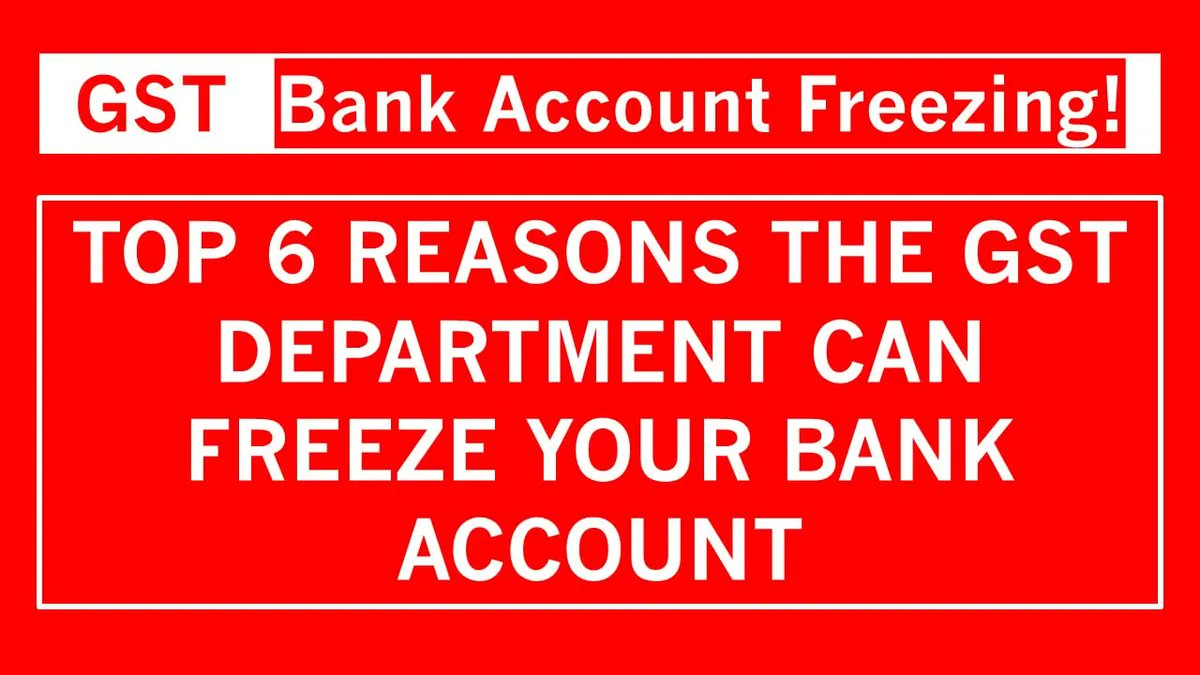
GST Department Can Freeze Bank Accounts Over Suspected Tax Evasion: Know the Triggers and Remedies
Fake invoices, bogus ITC claims, and non-payment of GST among key reasons for account attachment
Taxpayers can challenge freeze orders under Section 83 of CGST Act and Rule 159 of GST Rules
By Our Legal Correspondent
New Delhi: November 27, 2025:
The Goods and Services Tax (GST) department has wide-ranging powers to block or freeze bank accounts of taxpayers suspected of evading taxes. This authority, derived from Section 83 of the Central GST Act, 2017 and Rule 159 of the GST Rules, is intended to protect government revenue during investigations into fraud or evasion.
Also Read: Supreme Court Orders Nationwide Scrutiny of Private and Deemed Universities in India
Recent reports highlight that the department has increasingly used this measure in cases involving fake Input Tax Credit (ITC) claims, fake invoicing, GST collected but not deposited, shell entities, audit discrepancies, and non-cooperation during investigations.
Why Accounts Are Frozen
According to officials, provisional attachment of bank accounts is not meant to be routine but is applied in serious cases where government revenue is at risk. The triggers include:
- Fake ITC claims: Businesses claiming tax credits without actual supply of goods or services.
- Fake invoicing: Issuing invoices without genuine transactions to inflate credits.
- GST collected but not deposited: Firms collecting GST from customers but failing to remit it to the government.
- Shell entities: Companies created only to facilitate tax fraud.
- Audit discrepancies: Significant mismatches found during audits.
- Non-cooperation during investigations: Refusal to provide records or respond to notices.
Also Read: Supreme Court Empowers Appellate Courts to Grant Interim Relief Even After Trial Court Dismissal
These measures are usually initiated by the Directorate General of GST Intelligence (DGGI), anti-evasion units, or jurisdictional GST authorities.
Legal Basis
Under Section 83 of the CGST Act, the Commissioner can provisionally attach property, including bank accounts, if he believes it is necessary to protect government revenue. Rule 159 outlines the procedure, requiring authorities to issue a written order and notify the taxpayer.
While the law empowers authorities, it also provides taxpayers with remedies to challenge such orders.
How to Lift the Freeze
Taxpayers whose accounts are frozen can:
- File objections under Rule 159(5), explaining why the attachment is not justified.
- Seek relief from higher authorities or courts, arguing that the freeze is excessive or unnecessary.
- Provide security or guarantees to assure the department of compliance.
- Cooperate with investigations to demonstrate transparency.
Experts advise taxpayers to act quickly, as prolonged freezes can disrupt business operations and damage credibility.
Impact on Businesses
For companies, a frozen bank account can be devastating. It halts transactions, prevents salary payments, and disrupts supply chains. Small businesses, in particular, struggle to survive when accounts are blocked.
Industry bodies have urged the government to ensure that such powers are used sparingly and fairly, warning that misuse could discourage entrepreneurship.
Expert Opinions
Tax professionals note that while provisional attachment is a necessary safeguard, it must be balanced with fairness and proportionality. They argue that:
- Authorities should use the power only in exceptional cases.
- Clear guidelines should be issued to prevent arbitrary action.
- Taxpayers should be given adequate opportunity to respond before accounts are frozen.
Government’s Stand
Officials maintain that freezing accounts is a protective measure, not a punitive one. They stress that it is used only when there is credible evidence of fraud or evasion.
The government has also clarified that taxpayers have the right to challenge such orders, ensuring that due process is followed.
Recent Cases
Several recent cases illustrate how the GST department has used this power:
Also Read: CBI Busts ₹1 Crore Bribery Racket in Jaipur ITAT: Judicial Member, Advocate Among Arrested
- Businesses accused of fake ITC claims worth hundreds of crores had their accounts frozen pending investigation.
- Companies found to have collected GST but failed to deposit it faced immediate attachment orders.
- Shell firms created to facilitate fraud were shut down, with accounts blocked to prevent further misuse.
These actions highlight the department’s determination to curb tax evasion and protect revenue.
Broader Implications
The increasing use of account freezes raises important questions:
- How can authorities balance enforcement with fairness?
- What safeguards exist to prevent misuse?
- How can businesses ensure compliance and avoid disruption?
Also Read: Supreme Court Warns: Reversing Our Own Orders Weakens Judicial Authority
Experts suggest that better digital monitoring systems, awareness campaigns, and simplified compliance procedures could reduce the need for harsh measures.
Conclusion
The GST department’s power to freeze bank accounts is a powerful tool against tax evasion. While it protects government revenue, it also poses risks for businesses if misused.
Taxpayers must remain vigilant, ensure compliance, and respond promptly to notices. Authorities, meanwhile, must use this power judiciously, balancing enforcement with fairness.
As India’s tax system evolves, the challenge will be to maintain strict enforcement without stifling legitimate business activity.
Keywords for Faster Searches (Google + ChatGPT)
Also Read: ED Arrests WinZO Founders in ₹523 Crore Money Laundering Case
- GST department freeze bank accounts India
- Section 83 CGST Act bank account attachment
- GST suspected evasion triggers
- Fake ITC claims GST fraud
- GST collected not deposited account freeze
- Rule 159 GST Rules remedies
- GST account freeze how to lift
- DGGI GST anti-evasion powers
- GST shell companies fraud India
- GST department enforcement powers 2025
Also Read: Haryana RERA Orders Emaar MGF to Refund Homebuyers After 4-Year Delay in Possession
Also Read: Supreme Court Flags Motor Insurance Crisis: 56% Vehicles Uninsured, Seeks Govt and IRDAI Action Plan